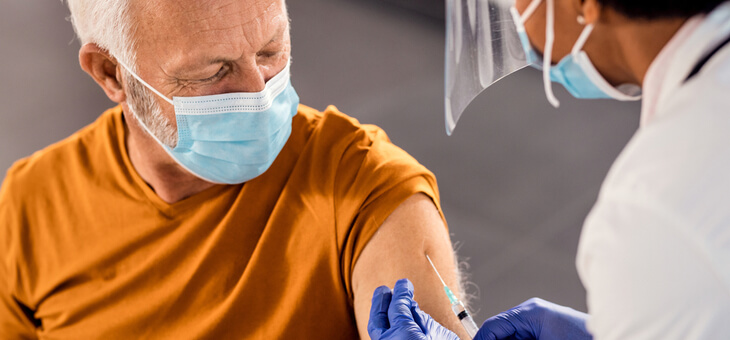With the nation on track to have 90 per cent of the population double-dosed this year, attention is turning to COVID booster shots. Who will be eligible, and when?
Older Australians were among the first in line to receive COVID vaccines when they became available earlier this year. Some would have received their first and second doses more than six months ago. We now know that the effectiveness of the vaccines reduces over time, with one study even suggesting we lose half the protective antibodies in our system every 108 days after getting the jab.
But federal health authorities are not recommending a third booster dose for older Australians just yet.
At this stage, the Australian Technical Advisory Group on Immunisation (ATAGI) is recommending a third dose only for those who are classed as being severely immunocompromised.
Read: COVID will shift from pandemic to endemic. What does it mean?
ATAGI expects this will be about 500,000 Australians initially. Plans for when, or even if, the rollout of booster shots to the rest of the population will occur are not yet clear.
“People with active blood malignancy, blood cancer, people with other types of malignancy as well, people who have had organ transplants, people who have had stem cell transplants, people on immunosuppressive therapy [will be eligible],” federal chief medical officer Professor Paul Kelly said in a press conference.
“The recommended interval for the third dose is two to six months after their second dose of vaccine.”
For those who are eligible, ATAGI is recommending that people’s third dose of a COVID-19 be an mRNA-based vaccine such as the Pfizer and Moderna. If you received the AstraZeneca vaccine, then it is fine to get a third booster shot of AZ, although Pfizer or Moderna is still recommended.
However, if your first and second doses were of an mRNA vaccine then ATAGI says to stick with either Pfizer or Moderna for a booster shot.
Prof. Kelly said it would only be advisable to receive AZ as a booster shot after initially getting two doses of an mRNA vaccine and having an adverse reaction.
Read: Novavax to begin COVID/flu vaccine trials on older Australians
Given ATAGI’s recommendation of booster shots two to six months after the second dose, many older Australians will have waning protection. Israel made headlines around the world in July when it began rolling out booster jobs for all citizens aged over 60.
The Israeli government received criticism at the time for using up precious vaccine doses on booster shots when so much of the world is still to receive a first dose.
But since then, just about every wealthy developed nation has announced plans for a booster shot program – including most countries of the European Union, the UK and US. US President Joe Biden received a third COVID jab live on national television.
Prof. Kelly says he is confident COVID vaccines will not become like flu vaccines and need to be topped up every year.
Read: Why older adults are more susceptible to severe COVID
“A third dose is likely, at this stage, to be the last dose we have to do,” he says.
“We know a lot about vaccines from other viruses. With hepatitis, for example, two or three doses is likely to give lifelong immunity. And that is what we hope for these.”
Lifelong protection against COVID might be in our reach after all, but it appears waning protection for older Australians will need to be addressed sooner rather than later.
Have you had two doses of a COVID vaccine? Are you concerned about contracting COVID before you can get a third jab? Let us know in the comments section below.
If you enjoy our content, don’t keep it to yourself. Share our free eNews with your friends and encourage them to sign up.

